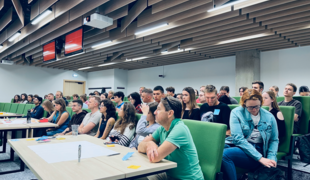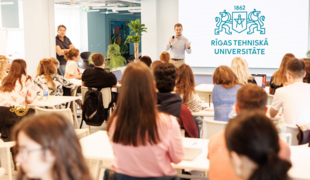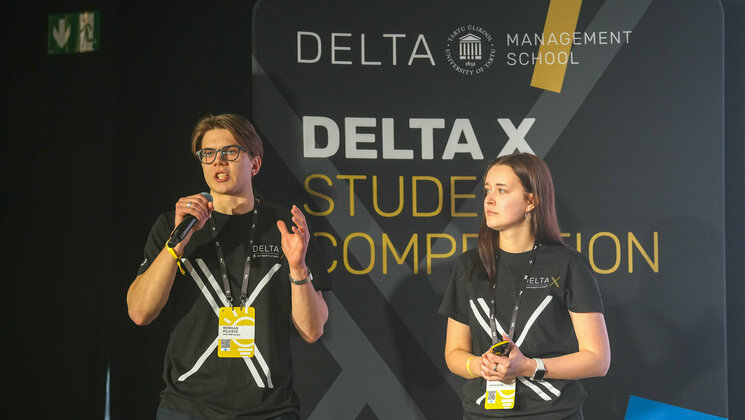-
Faculty of Arts and HumanitiesDean's Office, Faculty of Arts and HumanitiesJakobi 2, r 116-121 51005 Tartu linn, Tartu linn, Tartumaa EST0Institute of History and ArchaeologyJakobi 2 51005 Tartu linn, Tartu linn, Tartumaa EST0Institute of Estonian and General LinguisticsJakobi 2, IV korrus 51005 Tartu linn, Tartu linn, Tartumaa EST0Institute of Philosophy and SemioticsJakobi 2, III korrus, ruumid 302-337 51005 Tartu linn, Tartu linn, Tartumaa EST0Institute of Cultural ResearchÜlikooli 16 51003 Tartu linn, Tartu linn, Tartumaa EST0Institute of Foreign Languages and CulturesLossi 3 51003 Tartu linn, Tartu linn, Tartumaa EST0School of Theology and Religious StudiesÜlikooli 18 50090 Tartu linn, Tartu linn, Tartumaa EST0Viljandi Culture AcademyPosti 1 71004 Viljandi linn, Viljandimaa EST0Professors emeriti, Faculty of Arts and Humanities0Associate Professors emeriti, Faculty of Arts and Humanities0Faculty of Social SciencesDean's Office, Faculty of Social SciencesLossi 36 51003 Tartu linn, Tartu linn, Tartumaa EST0Institute of EducationJakobi 5 51005 Tartu linn, Tartu linn, Tartumaa EST0Johan Skytte Institute of Political StudiesLossi 36, ruum 301 51003 Tartu linn, Tartu linn, Tartumaa EST0School of Economics and Business AdministrationNarva mnt 18 51009 Tartu linn, Tartu linn, Tartumaa EST0Institute of PsychologyNäituse 2 50409 Tartu linn, Tartu linn, Tartumaa EST0School of LawNäituse 20 - 324 50409 Tartu linn, Tartu linn, Tartumaa EST0Institute of Social StudiesLossi 36 51003 Tartu linn, Tartu linn, Tartumaa EST0Narva CollegeRaekoja plats 2 20307 Narva linn, Ida-Virumaa EST0Pärnu CollegeRingi 35 80012 Pärnu linn, Pärnu linn, Pärnumaa EST0Professors emeriti, Faculty of Social Sciences0Associate Professors emeriti, Faculty of Social Sciences0Faculty of MedicineDean's Office, Faculty of MedicineRavila 19 50411 Tartu linn, Tartu linn, Tartumaa ESTInstitute of Biomedicine and Translational MedicineBiomeedikum, Ravila 19 50411 Tartu linn, Tartu linn, Tartumaa ESTInstitute of PharmacyNooruse 1 50411 Tartu linn, Tartu linn, Tartumaa ESTInstitute of DentistryL. Puusepa 1a 50406 Tartu linn, Tartu linn, Tartumaa ESTInstitute of Clinical MedicineL. Puusepa 8 50406 Tartu linn, Tartu linn, Tartumaa ESTInstitute of Family Medicine and Public HealthRavila 19 50411 Tartu linn, Tartu linn, Tartumaa ESTInstitute of Sport Sciences and PhysiotherapyUjula 4 51008 Tartu linn, Tartu linn, Tartumaa ESTProfessors emeriti, Faculty of Medicine0Associate Professors emeriti, Faculty of Medicine0Faculty of Science and TechnologyDean's Office, Faculty of Science and TechnologyVanemuise 46 - 208 51003 Tartu linn, Tartu linn, Tartumaa ESTInstitute of Computer ScienceNarva mnt 18 51009 Tartu linn, Tartu linn, Tartumaa ESTInstitute of GenomicsRiia 23b/2 51010 Tartu linn, Tartu linn, Tartumaa ESTEstonian Marine Institute0Institute of PhysicsInstitute of ChemistryRavila 14a 50411 Tartu linn, Tartu linn, Tartumaa EST0Institute of Mathematics and StatisticsNarva mnt 18 51009 Tartu linn, Tartu linn, Tartumaa EST0Institute of Molecular and Cell BiologyRiia 23, 23b - 134 51010 Tartu linn, Tartu linn, Tartumaa ESTTartu ObservatoryObservatooriumi 1 61602 Tõravere alevik, Nõo vald, Tartumaa EST0Institute of TechnologyNooruse 1 50411 Tartu linn, Tartu linn, Tartumaa ESTInstitute of Ecology and Earth SciencesJ. Liivi tn 2 50409 Tartu linn, Tartu linn, Tartumaa ESTProfessors emeriti, Faculty of Science and Technology0Associate Professors emeriti, Faculty of Science and Technology0Institute of BioengineeringArea of Academic SecretaryHuman Resources OfficeUppsala 6, Lossi 36 51003 Tartu linn, Tartu linn, Tartumaa EST0Area of Head of FinanceFinance Office0Area of Director of AdministrationInformation Technology Office0Administrative OfficeÜlikooli 17 (III korrus) 51005 Tartu linn, Tartu linn, Tartumaa EST0Estates Office0Marketing and Communication OfficeÜlikooli 18, ruumid 102, 104, 209, 210 50090 Tartu linn, Tartu linn, Tartumaa EST0Area of RectorRector's Strategy OfficeInternal Audit OfficeArea of Vice Rector for Academic AffairsOffice of Academic AffairsUniversity of Tartu Youth AcademyUppsala 10 51003 Tartu linn, Tartu linn, Tartumaa EST0Student Union OfficeÜlikooli 18b 51005 Tartu linn, Tartu linn, Tartumaa EST0Centre for Learning and TeachingArea of Vice Rector for ResearchUniversity of Tartu LibraryW. Struve 1 50091 Tartu linn, Tartu linn, Tartumaa EST0Grant OfficeArea of Vice Rector for DevelopmentCentre for Entrepreneurship and InnovationNarva mnt 18 51009 Tartu linn, Tartu linn, Tartumaa EST0University of Tartu Natural History Museum and Botanical GardenVanemuise 46 51003 Tartu linn, Tartu linn, Tartumaa EST0International Cooperation and Protocol Office0University of Tartu MuseumLossi 25 51003 Tartu linn, Tartu linn, Tartumaa EST0
Bus Baltica: Students Developing Sustainable Mobility Solutions in the Baltics

At the start of the 2024 fall semester, a remarkable collaboration project called the Bus Baltica 6-Day Sustainable Mobility Training Program took place, bringing together students and mentors from Estonia, Latvia, and Lithuania. The aim of the initiative was to tackle some of the most pressing challenges in modern transportation and urban mobility. The project was organized by the Chair of Entrepreneurship at the University of Tartu, in collaboration with Riga and Kaunas Technical Universities, and supported by EIT Urban Mobility. The Dutch consultancy and training company Kimitisik led the practical workshops, providing participants with both theoretical knowledge and the opportunity to work on real-world tasks related to the Rail Baltica project.
Over six days, teams developed innovative solutions ranging from eco-friendly ideas, such as universal water bottle holders, to complex digital platforms aimed at enhancing the travel experience. One of the standout ideas came from Team EnterT[r]ain, which won first place with its entertainment solutions, offering interactive games and customized content on trains, particularly for children and families.
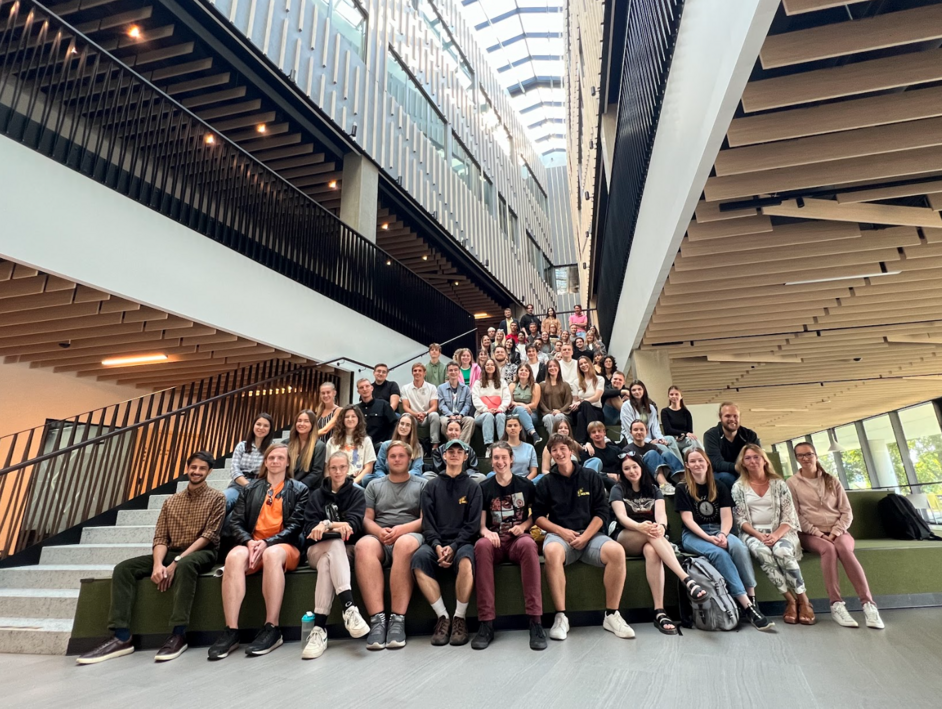
Participant Feedback: Why Was This Experience Special?
The project was intense, but participants highly valued the experience. Liisa Tulvik, a student from Viljandi Culture Academy, described her experience as inspiring. “Even though I went into the project with relatively low expectations, I found myself traveling across the Baltics and enjoying working with a diverse group of people," Liisa shared. She emphasized that the greatest value was in the interaction with people and developing an entrepreneurial mindset: “The project was more about learning and making new connections than simply finding a solution for Rail Baltica.”
Andres Soop, a doctoral student in economics, described the week as a true mental workout. “It felt like we were completely stuck, but after long days and spontaneous evening brainstorming sessions, a new and functioning idea was born,” Andres said. In his view, the cooperation between participants and the international networking were invaluable, contributing to professional growth in the future.
Mark Kauer, a business student, started the project modestly but found himself opening up and gaining confidence. "Bus Baltica made me a bolder communicator and gave me the confidence that I can successfully present my ideas," Mark stated. The project’s practical approach gave him new insights into the processes of business development and the importance of teamwork.
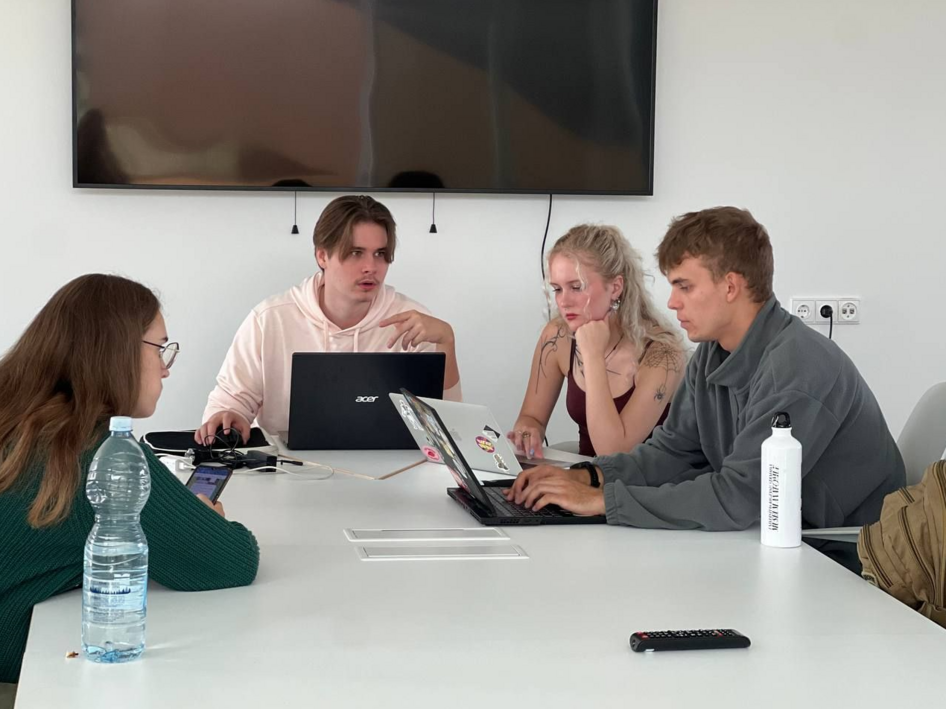
New Connections and Ideas for Future Mobility Solutions
One of the most important aspects of the project was the collaboration between students from various academic fields. Kertu Vuks, head of the Tartu Spatial Design Department, pointed out that this interdisciplinary approach enriched the project and offered new perspectives. "Students were able to exchange ideas and knowledge while creating new connections that could prove to be important in the future," she said.
Although the project focused on finding solutions for the future of Rail Baltica, participants highlighted that the experience was much more than that. It provided them with an opportunity to learn teamwork, develop entrepreneurial skills, and broaden their horizons while being both fun and challenging.
While the week passed quickly, Bus Baltica remains a valuable experience for its participants, offering plenty of new knowledge, friendships, and insights into the future of transportation. https://sites.google.com/kimitisik.eu/busbaltica/home
Read more similar news





